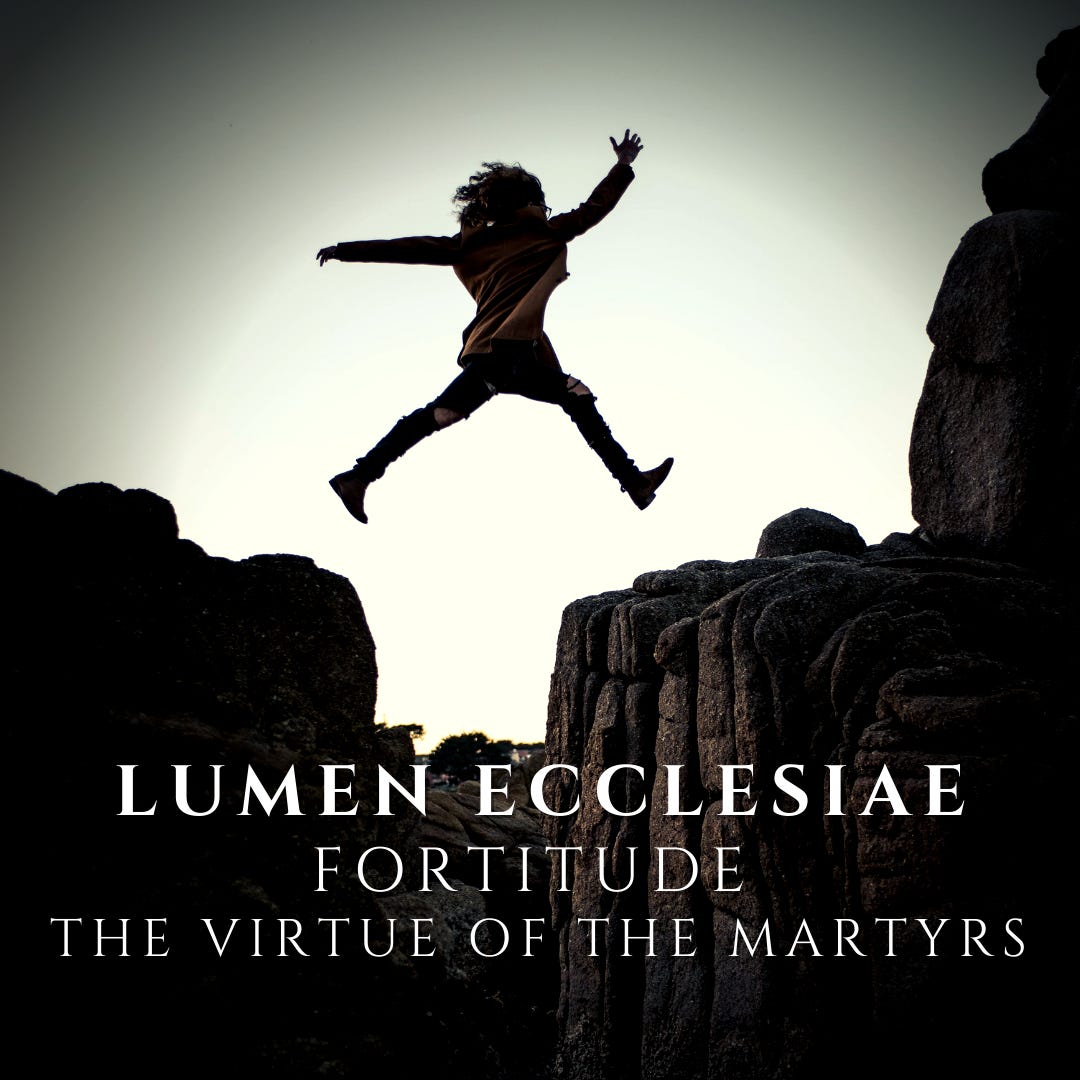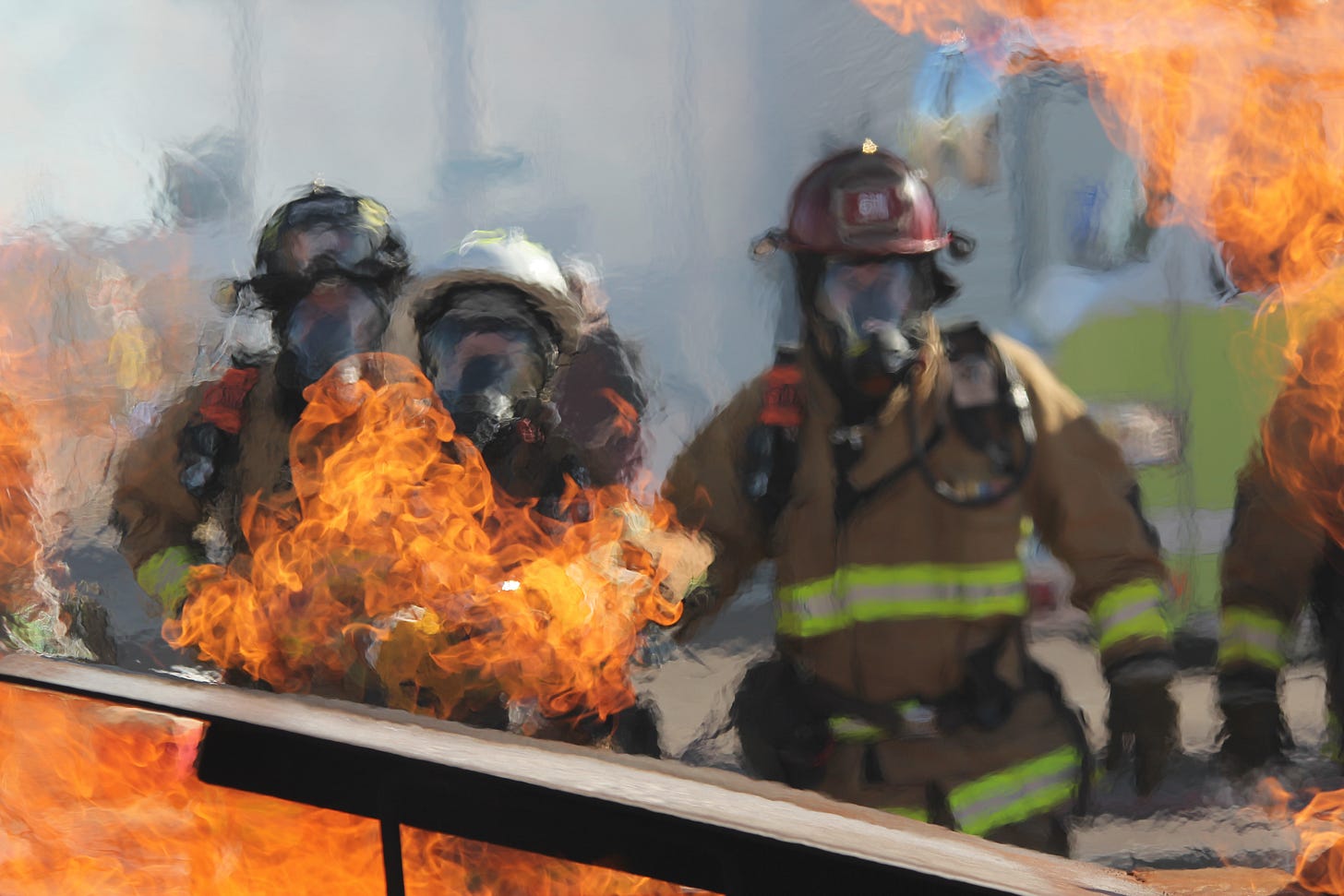Running Towards Virtue | Fortitude
Fortitude, also known as courage, is the virtue of every martyr
We have already discussed the virtues of Prudence and Justice and now we can explore the virtue which comes from these other two: Fortitude, also known as Courage.
This virtue is perhaps most visible in the martyrs. In and through their example we see what it means to face death in hope and to endure courageously for the sake of Christ.
It is Fortitude then which is the virtue of the martyrs.
But that does not mean that the martyrs did not possess the other virtues, far from it!
The virtue of Fortitude is only present when one is also Prudent and Just. We see here the complementary and symbiotic relationship between the virtues.
Here are two examples to articulate this reality.
Take for example two boys who decide to get in their separate vehicles and to play a game of chicken with one another.
If we were to simply call Fortitude or Courage the willingness to face pain and suffering, this would be a fine enough example of Fortitude.
And yet something about that definition does not sit right with us. We would not call these boys courageous but rather foolish and even idiotic.
And so we look at the other virtues. As we noted before, Prudence enables us to see rightly and to act well in the pursuit of the Good. What Good is at stake here in this game of vehicular chicken ? Nothing but the pride and foolishness of two young boys. Fortitude is not present here where there are no real goods at stake.
To dare and to truly be courageous requires reflection and the capacity to see and judge rightly and wisely.
“For this too is our way: to dare most liberally where we have reflected best.”
-Pericles, Funeral Oration during the Peloponnesian War
Let’s investigate another example. A thief risks life and limb in order to steal a priceless work of art from a nearby home and is almost shot by the homeowner.
We might call the thief clever for his theft but certainly not courageous even though he did risk his life for a higher good (the piece of art).
His theft is an unjust act and Fortitude to be the virtue that it is, must be just.
Fortitude when used for evil purposes twists itself into an aggressive behavior, indifferent to suffering of all kinds, and is to be found among tyrants, dictators, criminal, and rapists all of whom seek their own good as the highest good and at the expense of all others.
In such men and women, once again, we do not have the virtue of Fortitude present.
What then is Fortitude?
Basically put: Fortitude is the willingness to suffer pain, and even death, for a higher good. Parsing that definition out, we can see the beautiful but complex picture painted by this virtue.
First of all, Fortitude is a willingness to suffer. To be brave and to have this virtue means we must in some sense be capable of injury, we must be vulnerable.
Take for example the imaginary person of Superman. Most of the time, when not in the presence of Kryptonite, Superman is invincible.
Strictly speaking, the invincible man is not capable of being brave because injury and vulnerability are beyond him.
Paradoxically then, it is only in our ability to suffer that we are capable of acquiring the virtue of Fortitude.
Now to endure and to suffer is one aspect of Fortitude but there are two: endurance and attack.
Most often we associate this virtue with that aspect called endurance, with the patient endurance and outlasting of evil which we cannot hope to match by our own strength.
But the other aspect of Fortitude, attack, is just as important. By the virtues of Prudence and Justice we can see rightly and we know when an evil can be fought and we know we must fight it in such cases.
Thus, the courageous woman, is one who pounces upon evil in the hopes of ending it.
This brings up an important and often misunderstood point about suffering: suffering or injury, is never a good in itself. Always it is the cause for which we suffer that is good and never the injury itself.
Thus, if evil or suffering can be ended, they should, without exception.
Suffering, injury, and privation remain an evil at all times and are never founts of life in themselves.
“To take death upon oneself is not in itself praiseworthy, but solely because of its subordination to good”
-Thomas Aquinas, Summa Theologiae II-II 124, 3
The person who has Fortitude must also consider his or her life, and the goods he or she has, as something to be valued, even if, for a higher good (such as God), they must be sacrificed.
The fatalist who cares nothing for his life or considers the material world a deplorable evil, is not courageous when he risks death since he risks nothing at all! He is risking no good at all in his mind.
Instead of risking goods for the sake of another higher good, he is trying to escape from the reality around him and that is certainly not Courage.
And finally for this section, it is important to note that while Courage and Fortitude are often considered masculine virtues, they are virtues for all Christians and, in many ways, it is women, more than men, who show us what it means to patiently endure in hope.
It was Mary and the the holy women who stood at the foot of the Cross and put the Apostles to shame with their Courage and willingness to endure.
Consider also the life of a mother who, for the sake of her child, will suffer and endure much, more than even a solider might for his country. In this is true courage the likes of which is to be found in the martyrs.
Fortitude or Courage is a virtue for every Christian and forms the very basic foundation of our evangelistic witness.
In summation
Fortitude or Courage exists only in one who is both prudent and just and it is a willingness to suffer even death for the sake of a higher good.
Fortitude is not fearlessness nor is it simply passive endurance of pain for its own sake, but always for the sake of something higher and better.
For the Christian this higher good must always be found in our Triune God.
The martyr is the preeminent example of Fortitude. In the martyrs we see the acceptance and endurance of injury and privation for the sake of a higher good and a more complete intactness.
Even as the bodies of the martyrs falter, they acquire a spiritual wholeness which is beyond our wildest dreams.
This does not mean that we should simply throw ourselves into situations where we might die however. That would be rash foolishness and would be disregarding the gift of life which God has granted us.
We need only look at early Church leaders such as Polycarp and Cyprian who specifically warned their churches against such foolish actions to know the error of intentionally seeking out pain and suffering.
Instead of seeking out pain, we can offer up those sufferings which naturally enter into our lives and endure them with patient nobility for the sake of higher goods: justice, peace, sanctification, and most importantly, God himself. In this is found virtue.
Final Thoughts for Reflection
1. Reflect on an experience where fortitude was necessary
Take a moment and look back on your life. Look back without incrimination or shame and simply consider for a moment when the virtue of Fortitude would have helped bring about a better result.
2. Identify one person in your life that best exemplifies Fortitude
We often speak about role models and how important they are in our lives. Who in your life models the virtue of Fortitude? How do they model it on a regular basis? Next consider how this person came to be this type of person. What circumstances and experiences influence and inform their actions? How might you adapt this person’s example for your own life?
4. Practice, practice, practice.
Consider what habits of life will incline you more toward Fortitude. Begin with endurance; it is the easier of the two to think of in terms of virtue development. Write out a few daily practices, such as serving a neighbor or perhaps performing an act which is unknown and unappreciated by others.
In terms of attack or active courage, try to find an action or practice which helps you step beyond your fear. What are you afraid of? Maybe you are afraid of dogs and so you decide to volunteer at a dog shelter.
Or perhaps you are afraid to speak out in the workplace when you have an idea. Commit yourself to speaking out at least once a week when you believe in your ideas.
No matter what it might be, Fortitude is a virtue for us all.




